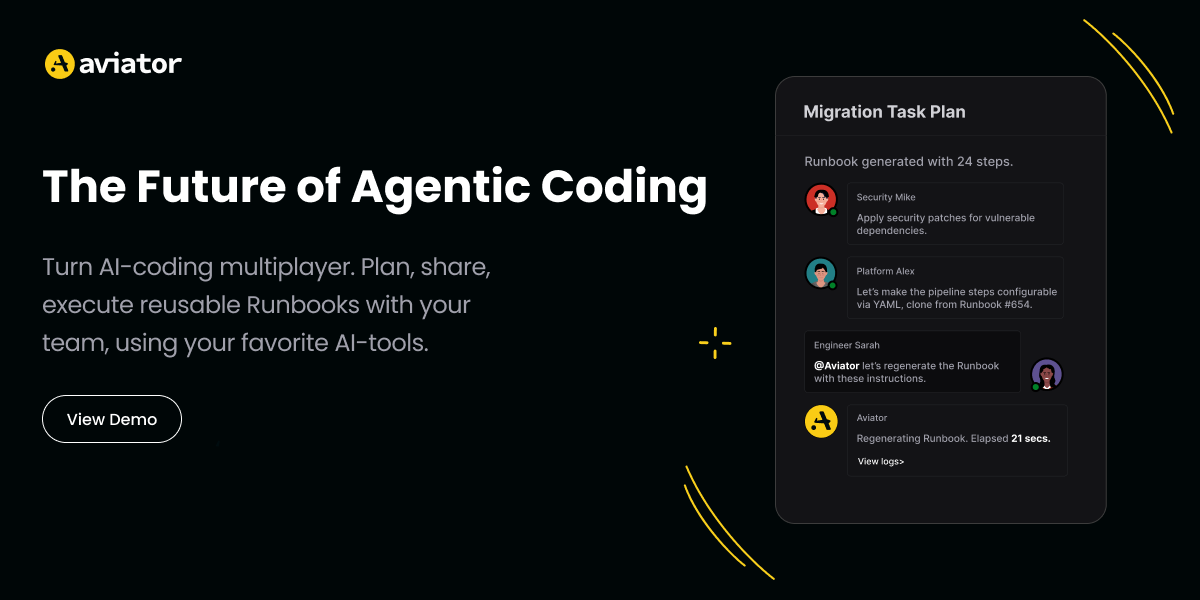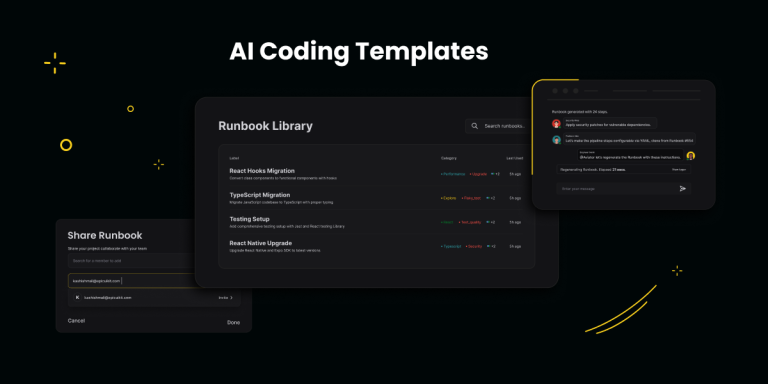Aviator Runbooks: Turn AI Coding Multiplayer with Spec-Driven Development
Spec-driven development replaces the chaos of ad hoc, prompt-driven vibe coding with a structured, durable way for engineering teams to work on AI coding projects.

As large engineering organizations adopt agentic coding, teams struggle to maintain shared context, capture intent, and version AI-generated changes.
Runbooks is a new spec-driven development product from Aviator that lets teams author versioned, executable specs so AI agents can safely run, review, and improve code with multiplayer collaboration and audit trails.
At its core, Runbooks establishes a shared, versioned library of executable specifications (Runbooks) that drive AI agents.
The Spec-Driven and Multiplayer Era
Spec-driven development replaces the chaos of ad hoc, prompt-driven vibe coding with a structured, durable way for engineering teams to work on AI coding projects:
- Collaboration: multiple engineers can co-author and review specs, fork and evolve workflows, and edit agent-generated outputs.
- Context continuity: Runbooks automatically capture repository state, PR feedback, and code changes into a living knowledge base.
- Version control built-in: Every change is recorded; you can audit, roll back, or compare versions.
- Safe delegation: Break down tasks into steps agents can execute, and reviews feed back into spec evolution.
Aviator CEO and co-founder Ankit Jain says the future of software development is agentic and multiplayer:
Building software with AI agents isn’t a solo sport, especially when projects touch multiple repos, services, and prompt engineering knowledge. Runbooks capture the team’s AI prompting knowledge and execution patterns that evolve.
Teams can switch from single-player to multiplayer mode and collaborate on prompts, share execution workflows, and maintain audit trails.
Designed for engineering and platform teams that want to turn AI coding from individual experiments into team-wide engineering projects, Runbooks enables multiplayer spec-driven coding where AI and humans collaborate, and the team’s AI prompting knowledge and execution patterns are preserved.
If you’re curious to see how spec-driven multiplayer AI coding works, choose a template project from our open-source library and try Runbooks.

How Runbooks Works
- Plan: Write a specification (in natural language or structured format) or choose a template from our open-source library. Team members can comment on, review, and refine the spec.
- Provision: Launch an isolated sandbox (remote or on your infrastructure) where agents can inspect code, ask questions, and propose changes.
- Run / Execute: Agents execute the Runbook in steps. You can control execution – step by step or all at once.
- Review & Merge: Each step produces stacked pull requests. Human reviewers provide feedback directly in GitHub; agents can rewrite or refine based on the feedback. Approved PRs can be merged manually or via automated merge queues.
- Share & Evolve: Fork, publish, or customize Runbooks in your team’s library. The system captures feedback and context over time, evolving the spec corpus with each iteration.
Runbooks integrates with existing developer tooling (CLI agents, build tools, Git hosts) and works in your infrastructure or in a managed cloud.









